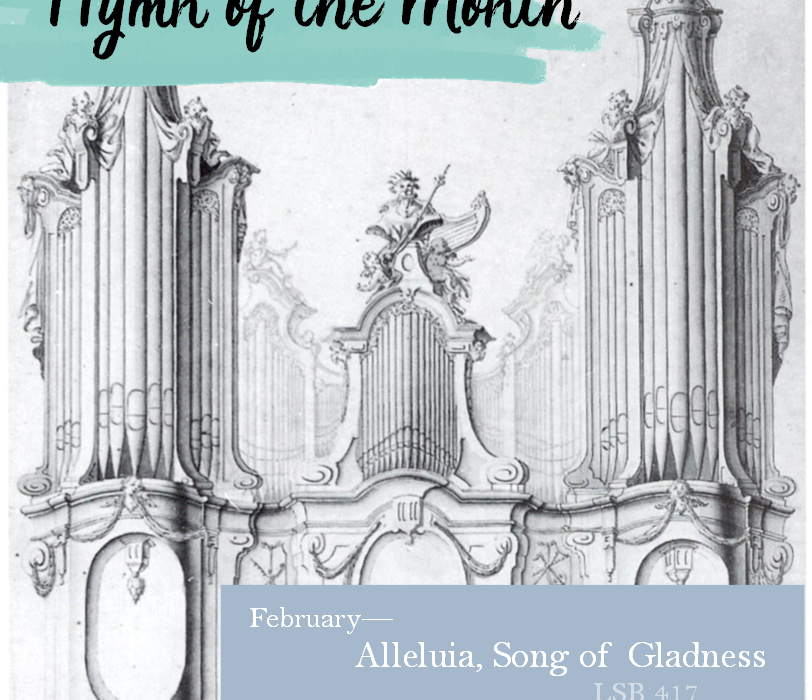Hymn of the Month
Alleluia, Song of Gladness (LSB 417)
This tenth-century hymn, known affectionately as the “farewell to alleluias,” has been sung for hundreds of years as Christians approach the penitential season of Lent. During those six weeks that lead up to Easter, we close our lips from such a joyful expression in order to reflect upon our desperate estate and our need for the Savior. During this time, we don’t sing “alleluia” before the Gospel reading, we refrain from using it in our canticles, and we cease to sing hymns that even contain the word.
Alleluia, as you may know, is a word we English-speakers stole directly from Hebrew (well, Greek, actually; and the Greeks stole it from the Hebrew hallelujah). It is a jubilant exclamation that means “praise Yahweh!” St. John records in Revelation 19 that this is word is the eternal chorus of heaven:
Hallelujah!
For the Lord our God
the Almighty reigns.
Let us rejoice and exult
and give him the glory,
for the marriage of the Lamb has come…
Therefore, the first stanza of our hymn of the month quite appropriately calls it the “voice of joy that cannot die.”
That is ironic, in a way, because a practice that apparently accompanied the singing of this hymn was the ceremonial burying of “Alleluia” in a coffin, complete with a full funeral service! (And people say Christianity is boring… ha!). Alleluia remained physically buried in the ground from the beginning of Lent all the way until Easter, when it was finally unearthed—resurrected, you might say!—with joy and festivity.
That funny little practice encapsulates a serious sentiment, though. We see it reflected at the end of stanza 2 and throughout stanza 3: “Babylon’s sad waters” and “mourning exiles” are a reference to Psalm 137, a psalm chanted by God’s people in their exile to Babylon, while their captors taunted them to sing songs of home… “How shall we sing the Lord’s song in a foreign land,” they wailed in response. Likewise, we Christians mourn humanity’s self-imposed exile from the presence of God, our Fall into sin; but, “we do not grieve as those without hope” (1 Thessalonians 4:13)! Rather, as stanza 3 recognizes, these tears are only for a time, for Easter is coming…
And just as our Lord died for a time, but rose on the Third Day, so too our alleluias will not stay silent, but rise again on Easter morn! Hence the last stanza breaks forth in rapture, “Therefore in our hymns we pray Thee, Grant us, blessed Trinity, At the last to keep Thine Easter… singing Alleluia joyfully.”
On February 27th, we will celebrate the Feast of the Transfiguration, which is always the last Sunday before Lent begins with Ash Wednesday. Prepare yourself, because on Transfiguration Sunday, the last hymn we will sing is our hymn of the month, “Alleluia, Song of Gladness.” Pack in all your alleluias until then—sing them profusely, exuberantly, excessively, even! Sing this hymn at breakfast, on the road, and in the shower; because once Lent comes, we won’t be singing alleluia anymore. Sing this song. And then, when we “bury Alleluia,” remember… Easter is coming.
Alleluia!



